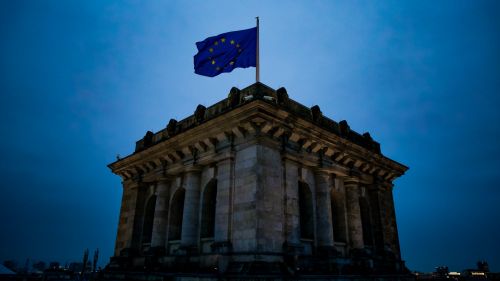A Future for the European Union After the Pandemic?

With the loss of Angela Merkel, will the EU survive COVID-19, which is yet another institutional and existential blow?
COVID-19 and Brexit
With borders now closed and countries like Italy in an increasingly restrictive nation-wide lockdown under the threat of the novel coronavirus, Europe is facing a crisis likely unparalleled since the end of World War II. This compounds an already disruptive year, following the exit of the United Kingdom from the European Union, and increasingly calls into question the continued relevance of the political and economic bloc.
In addition to the upheaval caused by Brexit, Turkey recently provided free passage to a large number of migrants and refugees into neighboring Greece. Greece responded by deploying its army to the border and suspending asylum applications—an apparent violation of both European and international humanitarian law.
Visions of perpetual peace, inclusive democracy, economic prosperity, and a liberal model of free-market ideology, which dominated attitudes and predictions for the future of European continent back in 1989, appear farther from realization. Instead, rising nationalism and increasing anti-establishment sentiment of recent years have given way to disillusionment. The age of multi-state expansions and bold policy harmonization appears to have stalled.
In a debate on the future of the European Union on the Council stage earlier this year, Columbia Law School’s Anu Bradford argued against this "glaring misperception that the European Union’s best days are over, that it is an increasingly irrelevant actor in the world." However, the unprecedented crisis now facing Europe is testing any enduring solidarity among the 27 countries remaining in the union. Is the pandemic, and Europe’s disjointed response to it, reflective of "the European inability to project power globally," as Bradford’s fellow panelist, Brookings’ James Kirchick, inferred?
With its national health care system straining under the weight of the novel coronavirus pandemic, Italy recently asked the European Commission to activate the EU Mechanism of Civil Protection—a request largely aimed at receiving basic medical supplies such as protective masks. The mechanism was explicitly founded to "improve prevention, preparedness and response to disasters," allowing member states to request assistance from its neighbors in the event that the scale of an emergency overwhelms or impedes domestic response capabilities. Not a single EU country responded to Italy’s SOS. Only China, where medical masks and much of the most critical medical equipment is manufactured, responded bilaterally. France, Germany, the Czech Republic, and other EU member states on the other hand, have refused to export medical supplies to Italy. Many have imposed significant restrictions on the export of medical goods to their most immediate neighbors within the European Union.
The European Union’s ability to effectively manage the financial crisis caused by the pandemic is also questionable. Initially slow to respond, the European Central Bank recently announced a €750 billion coronavirus stimulus package, dubbed the "Pandemic Emergency Purchase Programme," aimed at aiding the economic downturn across the eurozone. Though the European Commission also announced it is prepared to "do whatever is necessary to support the Europeans and the European economy," pledging economic support for aiding and strengthening national medical infrastructure, as well as helping local businesses in the protracted economic fallout that is likely to follow, questions about the feasibility of such funding remain.
Coronavirus is likely the European Union’s biggest test since the 2015 migrant crisis, which was significantly lessened by the particularly strong leadership of Germany under Angela Merkel. With the loss of Merkel, and considering the weak leadership offered by French president Emmanuel Macron, will the European Union survive yet another institutional and existential blow?
Undeniably, there is also a strange parallel between the two crises: both events saw the (previously unthinkable) reestablishment of national border checks at the heart of the European continent. The European Union, formally founded on principles of free movement, is now visibly shaken by what is transpiring in Italy and beyond. In many ways, European solidarity, vis-à-vis the integration of European economies and its people, remains a pivotal facet of the European project. Arguably, the crisis moves beyond the immediateness of the public health crisis that is yet to fully unfold. Is a prosperous future for the European Union after the pandemic possible, or does the peril of the pandemic reveal how superficial European solidarity really is?

